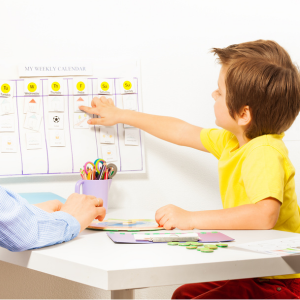
Proactive and Preventative Antecedent Strategies

Date Published: May 13, 2024 Author: Alania Sabankaya, RBT, Faces Behavioral Services
This blog post will discuss a commonly used strategy in Applied Behavior Analysis (ABA): antecedent strategies. Antecedent strategies, also known as proactive strategies, can help create structured routines, reduce distractions, and ensure all necessary materials are prepared for your activity or event. Antecedent strategies are tools that caregivers can use to create a safe, predictable, and positive environment for success.
How to implement antecedent strategies at home:
- Creating a structured routine, along with a visual guide, is an effective antecedent strategy to do at home. The two strategies support the planning and predictability of events and activities. Knowing a routine can be comforting and helpful for children when transitioning to a new activity or away from their preferred activity. Be sure to establish clear and direct expectations when presenting routines and requests in the visual guides.
- Environmental modifications can help reduce challenging behaviors and support behaviors we want to foster. Some examples of environmental modifications are:
- Reducing harsh lights or noises
- Organizing play and workspaces
- Taking measures to block access to unavailable areas or items
- Positive reinforcement is a powerful antecedent tool! By acknowledging desired or functional behaviors, we focus on what we want to see more of. Remember, behavior goes where reinforcement flows! This means the more we reward, praise, or reinforce a behavior, the more we will see it in the future.
Understanding our children’s needs and implementing proactive/antecedent strategies can foster a positive environment.
Resources:

About the Author:
Alania Sabankaya is a Registered Behavior Technician (RBT) and BCBA candidate on the Faces Behavioral Services team. Faces Behavioral Services, a department of the Pacific Autism Center for Education, supports children with autism in reaching their full potential utilizing Applied Behavior Analysis (ABA).
Disclaimer: “Keeping Up the PACE” is a blog operated by Pacific Autism Center for Education with information provided by professional therapists. This content is not intended for the purpose of diagnosis of any condition. If you have a question for our team, please email us at email hidden; JavaScript is required.

